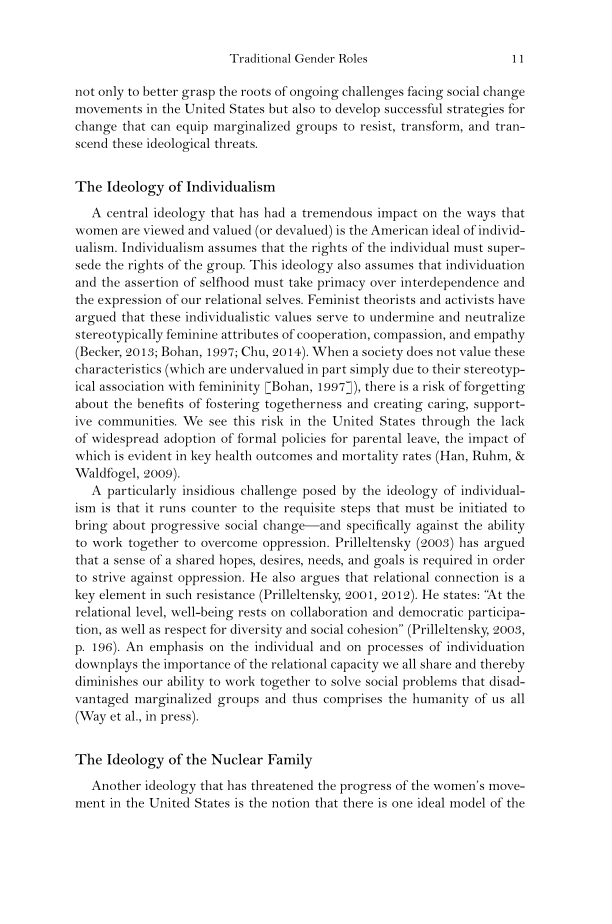Traditional Gender Roles 11 not only to better grasp the roots of ongoing challenges facing social change movements in the United States but also to develop successful strategies for change that can equip marginalized groups to resist, transform, and tran- scend these ideological threats. The Ideology of Individualism A central ideology that has had a tremendous impact on the ways that women are viewed and valued (or devalued) is the American ideal of individ- ualism. Individualism assumes that the rights of the individual must super- sede the rights of the group. This ideology also assumes that individuation and the assertion of selfhood must take primacy over interdependence and the expression of our relational selves. Feminist theorists and activists have argued that these individualistic values serve to undermine and neutralize stereotypically feminine attributes of cooperation, compassion, and empathy (Becker, 2013 Bohan, 1997 Chu, 2014). When a society does not value these characteristics (which are undervalued in part simply due to their stereotyp- ical association with femininity [Bohan, 1997]), there is a risk of forgetting about the benefi ts of fostering togetherness and creating caring, support- ive communities. We see this risk in the United States through the lack of widespread adoption of formal policies for parental leave, the impact of which is evident in key health outcomes and mortality rates (Han, Ruhm, & Waldfogel, 2009). A particularly insidious challenge posed by the ideology of individual- ism is that it runs counter to the requisite steps that must be initiated to bring about progressive social change—and specifi cally against the ability to work together to overcome oppression. Prilleltensky (2003) has argued that a sense of a shared hopes, desires, needs, and goals is required in order to strive against oppression. He also argues that relational connection is a key element in such resistance (Prilleltensky, 2001, 2012). He states: “At the relational level, well-being rests on collaboration and democratic participa- tion, as well as respect for diversity and social cohesion” (Prilleltensky, 2003, p. 196). An emphasis on the individual and on processes of individuation downplays the importance of the relational capacity we all share and thereby diminishes our ability to work together to solve social problems that disad- vantaged marginalized groups and thus comprises the humanity of us all (Way et al., in press). The Ideology of the Nuclear Family Another ideology that has threatened the progress of the women’s move- ment in the United States is the notion that there is one ideal model of the
Document Details My Account Print multiple pages
Print
You have printed 0 times in the last 24 hours.
Your print count will reset on at .
You may print 0 more time(s) before then.
You may print a maximum of 0 pages at a time.














































































































































































































































































































